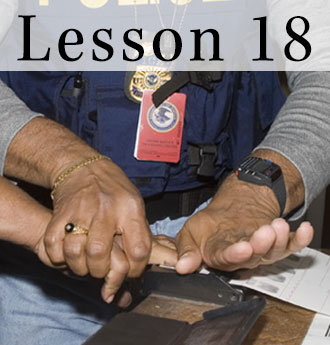The Resource Center » Level 3 » Unit 3 »
Lesson 18: How Has the Due Process Clause of the Fourteenth Amendment Changed the Constitution?

Lesson Purpose
Lesson Objectives
- explain the historical origins of due process,
- explain the difference between procedural and substantive due process,
- define the concept of incorporation and describe its effect on the powers of the states, and
- evaluate, take, and defend positions on historical and contemporary issues involving due process.
Lesson Terms
Lesson Biographies
Lesson Court Cases
Case Summary
The state of Louisiana enacted a law that required separate railway cars for blacks and whites. In 1892, Homer Adolph Plessy--who was seven-eighths Caucasian--took a seat in a "whites only" car of a Louisiana train. He refused to move to the car reserved for blacks and was arrested.
Question(s)
Is Louisiana's law mandating racial segregation on its trains an unconstitutional infringement on both the privileges and immunities and the equal protection clauses of the Fourteenth Amendment?
Answer(s)
No, the state law is within constitutional boundaries. The majority, in an opinion authored by Justice Henry Billings Brown, upheld state-imposed racial segregation. The justices based their decision on the separate-but-equal doctrine, that separate facilities for blacks and whites satisfied the Fourteenth Amendment so long as they were equal. (The phrase, "separate but equal" was not part of the opinion.) Justice Brown conceded that the Fourteenth Amendment intended to establish absolute equality for the races before the law. But Brown noted that "in the nature of things it could not have been intended to abolish distinctions based upon color, or to enforce social, as distinguished from political equality, or a commingling of the two races unsatisfactory to either." In short, segregation does not in itself constitute unlawful discrimination.
See: The Oyez Project, Plessy v. Ferguson, 163 U.S. 537 (1896)
Lesson Primary Sources
From Wikipedia: Magna Carta, is an English legal charter, originally issued in 1215, the first document ever served to an English king by his subjects. Magna Carta required King John to proclaim certain rights, respect certain legal procedures, and accept that his will could be restricted by the law. It explicitly protected certain rights of the King's subjects and supported what became the writ of habeas corpus, allowing appeal against unlawful imprisonment. Magna Carta was arguably the most significant early influence on the extensive historical process that led to the rule of constitutional law today in the much of the world.






